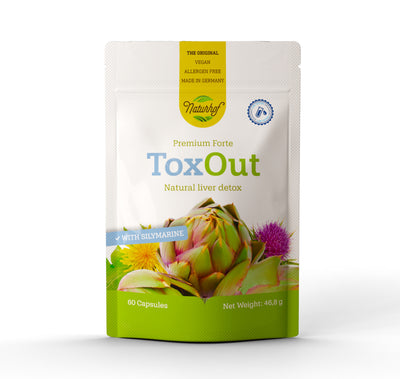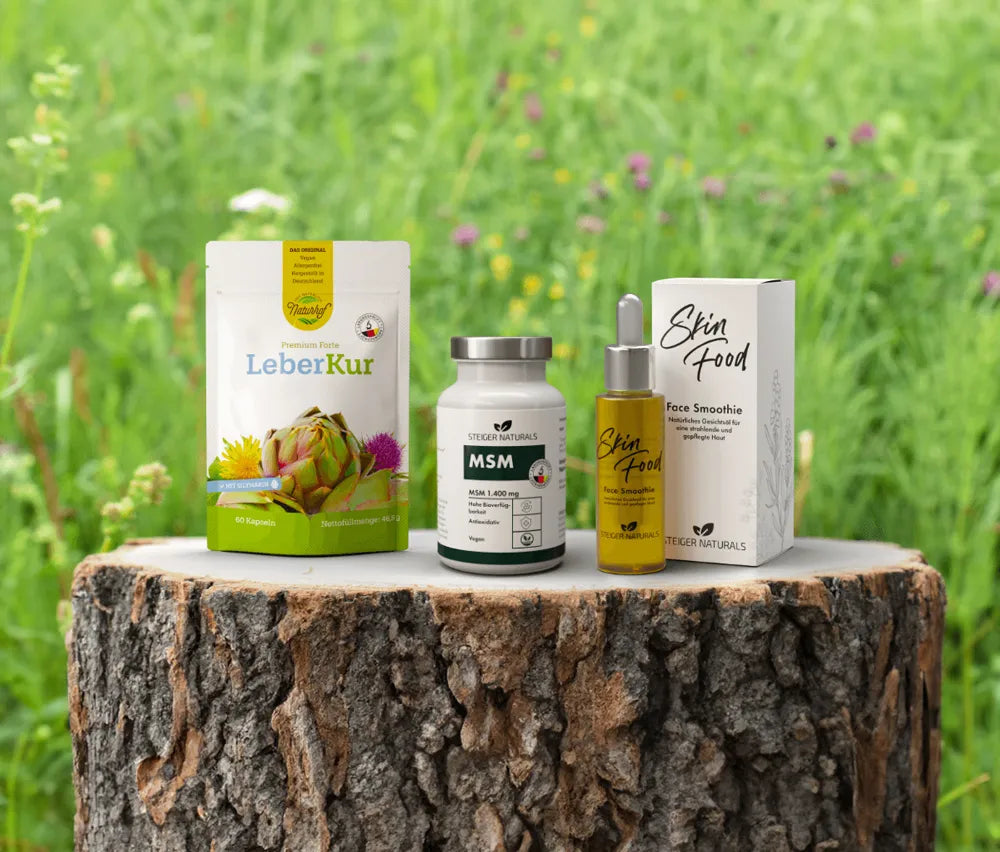Dietary supplement liver
The liver is one of the central organs in our body and a healthy liver can be the key to a vital life. Liver supplements offer a simple and effective way to support this important organ in our body.
High-quality liver products with choline are specifically designed to support the liver's diverse functions and relieve it in its daily work.* From regulating metabolism to detoxification, liver supplements can have a positive impact on your health.
Experience with Naturhof and Steiger Naturals how the power of natural ingredients can support your liver and the key ingredient choline can benefit your liver health.*

No products found
Use fewer filters or remove all
The liver is one of the central organs in our body and a healthy liver can be the key to a vital life. Liver supplements offer a simple and effective way to support this important organ in our body.
High-quality liver products with choline are specifically designed to support the liver's diverse functions and relieve it in its daily work.* From regulating metabolism to detoxification, liver supplements can have a positive impact on your health.
Experience with Naturhof and Steiger Naturals how the power of natural ingredients can support your liver and the key ingredient choline can benefit your liver health.*
We offer you a comprehensive overview of the different types of our nutritional supplements to support liver health.
This information can help you make the ideal choice for your needs. Discover the effective effects of our carefully formulated products and find out how they can help optimize your liver function.
How does the liver affect our health?
Learn more about the power of your liver! This amazing organ may be the key to a vital life.
AsMain detoxification organ of our bodyThe liver plays a crucial role in cleansing our system of toxins and efficiently processing nutrients.
Your performance can therefore have a direct impact on oursVitality and energyimpact. Impaired liver function, on the other hand, can lead to a variety of health problems that can affect our overall well-being.
So the liver is not just oneDetox expert, but also a central player in our overall health.
Good care and support of liver function are therefore essentialimportant step to physical balanceand promote inner harmony.
The diverse roles of the liver in the human body
The liver is a central player in our body, carrying out a variety of vital functions.
It acts as your personal “Health managerand is essential for maintaining physical well-being.
To better understand the liver's complex roles, let's look at some of itsMain functions in more detail:
- Detoxification:The liver plays a crucial role in detoxifying the body by filtering and neutralizing toxins and pollutants from the blood.
This process is essential to protect the body from harmful substances and maintain health.
- Production of bile:The liver is responsible for producing bile, which is essential for digesting fats in the intestines.
Without this process, the efficient absorption and utilization of fats and fat-soluble vitamins would not be possible.
- Metabolic regulation:As a central metabolic organ, the liver plays a key role in regulating the metabolism of proteins, carbohydrates and fats.
It is significantly involved in the production and distribution of energy in the body.
- Storage of nutrients:The liver acts as a store for important nutrients such as vitamins and minerals.
It regulates the availability of these vital substances and ensures that the body is always adequately supplied.
- Immune defense:The liver contributes to immune defense by identifying and eliminating pathogenic microorganisms and other harmful substances.
It therefore plays an important role in maintaining health and warding off diseases.
- Regulation of homeostasis:The liver is crucial for maintaining homeostasis, i.e. the balance of body processes.
For example, it regulates cholesterol levels and contributes significantly to blood clotting.
- Processing of medications and hormones:The liver processes and breaks down medications and hormones.
This function is essential to ensure the effectiveness of medications and avoid hormonal imbalances.
Conscious care of the liverhealthy diet, regular exercise and the avoidance of pollutants and toxinsis therefore crucial.
A healthy liver not only supports general well-being, but is also crucial for long-term health and disease prevention.
Which liver supplements really help?
Choosing effective liver supplements depends on the right ingredients.
Milk thistle, artichoke and dandelionare, for example, well-known active ingredients that support liver function and promote detoxification.Antioxidants such as vitamins C and Eare also useful.
Another important ingredient ischoline,an essential substance that fulfills a variety of functions in the body. Choline plays onecentral role in various metabolic processesand is especially for youe liver health is important.It contributes to maintaining normal liver function and supports the transport and metabolism of lipids. Choline is also involved in the formation of acetylcholine, an important neurotransmitter.
Choline deficiency can lead to liver diseases such as fatty liver disease. Liver products should therefore contain sufficient choline to support liver health and reduce the risk of liver disease. (1)
It is important to have a balanced composition that supports both detoxification and general liver health. Other helpful components canAmino acids, minerals and vitaminswhich can contribute to the general promotion of liver function.
Regular consumption of such supplements can be helpful in maintaining liver health and promoting overall well-being.
The benefits of a liver treatment: Optimize your liver health the natural way
The liver curefrom Steiger Naturals offers natural support for your liver health.
The treatment contains milk thistle, artichoke leaf and dandelion extracts that are finely tuned and...Supports the detoxification ability of the livern can. This combination can helpProtect liver cells and promote their regeneration.
With its valuable ingredients, the liver treatment aims to:To gently optimize liver functionand improve general well-being.
Harnessing the power of natural plants, it is a gentle way to promote liver health. Taking the liver cure regularly can helpReduce risk of liver problems and strengthen the immune system.
Expert tip:Many of our customers appreciate thisNaturhof Liver Treatment from Steiger Naturals, as it not only promotes general well-being, but also a valuable oneSupporting weight losscan represent.
A vital and healthy functioning oneLiver plays a key role in fat metabolism,an essential process for theWeight regulation.The liver is responsible for processing and converting fats from food. It helps convert fats into usable energy and stores excess fats for future energy needs.
Efficient liver function can for onebalanced fat metabolismcare that can make a significant contribution toIt is easier to reach and maintain your desired weight.
That's why bitter substance drops are good for your health
Bitter substance drops, like those from Steiger Naturals, can provide a variety of liver health benefits. They contain a mixture of valuable herbs and plant extracts that are known to...Stimulate digestion and support liver health*.
The ingredients canStimulate production of digestive juices, improve nutrient absorptionand are even said to help with detoxification. Bitter substance drops can be particularly useful for digestive problems and can help maintain healthy liver function. Regular consumption can promote digestion, stimulate metabolism and contribute comprehensively to general well-being.
How does liver drinking granules support liver function?
The liver complex drinking granulesfrom Steiger Naturals is designed to support liver health. This proven dietary supplement contains a blend of liver-friendly extracts such as artichoke and milk thistle, as well as vitamins E and B12.
This combination of ingredients can support the liver's natural detoxification ability by...Protection of liver cellspromotes and to theirregenerationcontributes. The granules are enriched with natural flavors of pineapple and mango, making it a refreshing drink that is easy to dissolve in water and enjoy. It is therefore very easy to integrate into your daily routine and ideal for daily liver care.
Extra tip:The liver complex drinking granules are also ideal as a supplement to other products such as the LeberFreund organic herbal tea from Steiger Naturals.
Herbal Tea for the Liver: A Natural Way to Liver Health
TheLeberFreund organic herbal teafrom Steiger Naturals is another option to support your liver health. Herbal teas have long been known for their health-promoting properties, particularly in the area of liver care.
Herbs such as milk thistle, artichoke and dandelion, commonly used in such teas, are known for theirliver supporting and detoxifying properties.
Regular consumption of herbal tea can therefore help support liver function, improve digestion and contribute to the overall detoxification of the body. LeberFreund organic herbal tea offers a natural and pleasant way to do something good for yourself and your liver.
The best tips for buying liver supplements
When purchasing liver supplements, there are several important aspects to consider in order to achieve the best possible results. Here are some key points to consider:
- Quality and purity of ingredients:Make sure that the products contain natural and high-quality active ingredients. Highly pure ingredients ensure better effectiveness and minimize the risk of side effects.
- Avoiding artificial additives:Products without artificial additives, preservatives or fillers are often more tolerable and safer. Natural formulations are generally healthier and more effective.
- Transparent labeling:Clear information about the ingredients and dosages is important in order to assess the effectiveness and safety of the product. This will help you make informed decisions and choose products that meet your specific needs.
- Origin of ingredients:Find out about the source of the ingredients. Products from trusted brands and manufacturers who carefully select their ingredients provide additional assurance of quality and effectiveness.
- Tailored to individual needs:Choose products that meet your personal health goals and needs. Not every supplement is right for every person, so it's important to find a product that's right for your specific situation.
Steiger Naturals only includes products in its product range that are carefully formulated to ensure the highest quality and purity.
Careful selection ensures that our customers receive products that are effective, safe and made from natural sources.
What is special about Naturhof products?
Naturhof products like thisLiver cureand theLiver friend bitter substance drops, are characterized by their special composition and high-quality natural ingredients.
They are tailored to support liver function and promote health. The products contain a combination of proven herbs and plant extracts that are known for their positive effects on the liver.
Naturhof attaches great importance to the quality and naturalness of its products, which is reflected in the selection of raw materials and the careful processing. The products are designed to naturally support the liver and optimize detoxification processes. Additionally, the products are often free of unnecessary additives, making them a tolerable and safe choice for promoting liver health.
The combination of natural ingredients, careful manufacturing and focus on liver health makes Naturhof products a popular choice for people who want to support their liver function naturally.
Conclusion
In today's world when health and well-being are the focus, liver care is more important than ever. Steiger Naturals can be your companion for a strong liver.* With our innovative liver products you can rely on natural and gentle support.
Our products are not only a testament to the power of nature, but also to our commitment to improving your well-being and quality of life. Remember, your liver deserves the best care, and with Steiger Naturals you have the best tools to harmonize and strengthen your liver naturally.
*Dietary supplements containing choline help maintain normal liver function. (2)
Sources:
- https://www.ncbi.nlm.nih.gov/pmc/articles/PMC3729018/
- https://www.ncbi.nlm.nih.gov/pmc/articles/PMC2782876/
-

Relevant blog articles
View all -
 Lesedauer: 18 minutes
Lesedauer: 18 minutes
Detoxify the liver: The best tips & remedies for the liver cleanse
read article -
 Lesedauer: 3 minutes
Lesedauer: 3 minutes
Detoxify the body: Tips for a healthy morning routine ✓
read article



 Lesedauer: 18 minutes
Lesedauer: 18 minutes


